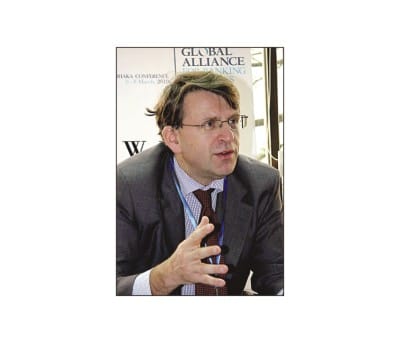An exemplar of ethical banking

Pierre Aeby
The financial crisis has opened scope for "sustainable banks" to become a reference for the global banking industry and governments in terms of ethical finance and serving unbanked people.
So says Pierre Aeby, a member of the executive board of the Netherlands' Triodos Bank, a leading European bank in sustainable and ethical finance and investments.
As a member of the Global Alliance for Banking on Values, a network of 11 banks from across the world, Aeby is attending the group's conference hosted by microfinance giant Brac at its training and management centre in Rajendrapur, Gazipur.
“We hope we'll be able to encourage the banks to have a business model that matches the values of the alliance,” Aeby told The Daily Star in an interview yesterday.
Aeby is confident about a bigger impact of the alliance on the global banking industry in next several years.
At the inauguration of the conference, he said the alliance would discuss how it can raise $250 million in new capital by pooling the expertise and resources of its members.
The fund will result in $2 billion in new lending in sustainable projects, at a time when credit continues to dry up in parts of the world, Aeby said.
The conference will also explore an education programme to develop a new breed of "sustainable bankers" to handle the money they raise. It will identify the issues that they are best placed to campaign on.
Aeby said different countries need different types of financing that depends on the local context and culture.
“Your country (Bangladesh) may require financing to small businesses and reaching out to unserved people. But it is different for Europe and other developed countries."
Members of the alliance attach priority to environmental-friendly and green projects in Europe rather than netting the unbanked population, said Aeby who has nearly three decades of experience in the banking industry in risk, investment and sustainable economic activities.
The Dutch banker said the new partnership plans to develop new ways of working, build organisations better suited to long-term sustainable thinking, and new forms of ownership and economic cooperation.
The number of alliance members is expected to grow to 13 from 11 now.
Aeby focused on China and India, the two countries that account for 40 percent of the world population, which are yet to be part of the alliance.
“We want other banks to join us,” he said. “But there must be a match in spirits.”
Eleven leading "sustainable" banks in the world launched the GABV in March 2009 in the Netherlands amid the global financial crisis. The aim of the alliance was to build a positive alternative to a global financial system.
Members of the alliance are: Alternative Bank ABS from Switzerland, Banca Popolare Etica from Italy, Banex from Nicaragua, BRAC Bank and BRAC Microfinance Programme from Bangladesh, GLS Bank from Germany, Merkur Bank from Denmark, Mibanco from Peru, New Resource Bank from the US, ShoreBank Corporation from the US, Triodos Bank from The Netherlands and XacBank from Mongolia.
The member banks are profitable, growing and mostly unaffected by the crisis and practise core-banking balancing three Ps: people, planet and profit.
These banks have assets of over $10 billion and serve over 70 lakh (seven million) customers in 20 countries.
To qualify for membership, each institution will have to meet three criteria: independent and licensed banks with a focus on retail customers, a minimum balance sheet of $100 million (Tk 700 crore) and commitment to responsible financing and the triple bottom line of people, planet and profit.
[email protected]

 For all latest news, follow The Daily Star's Google News channel.
For all latest news, follow The Daily Star's Google News channel. 



Comments